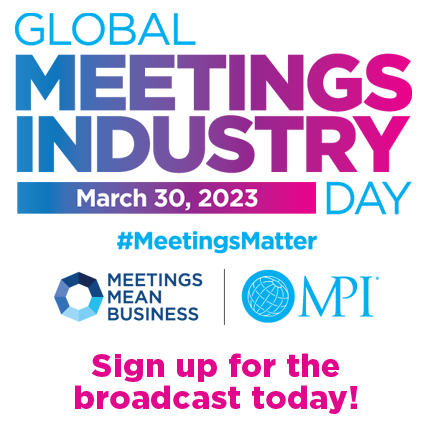The meeting industry will come together to celebrate Global Meetings Industry Day (GMID) on March 30, but did you know that a day now recognized and celebrated by meeting professionals around the world began in Canada?
The first official National Meetings Industry Day was held in Canada in 1999. This followed local and regional events hosted by Canadian MPI chapters (such as Meeting Planners Day in Edmonton) and conversations about elevating the celebration to a national level by the MPI Canadian Council—eventually leading to the first GMID in 2016.
As we get closer to GMID 2023, we’re honoring some of the MPI members in Canada who led volunteer efforts in the 1990s and understood before many others why the importance of our industry and its monetary and intrinsic value needed to be understood by governments and business.
Today, we chat with Barb Robinson, CMP, CMM, DES, from the Greater Edmonton Chapter.

Tell us about your role (chapter or regional) in MPI Canada in the 1990s.
My involvement with the Greater Edmonton Chapter started by becoming a member in 1997, then with a one-year Education Committee member position that year, followed by taking on the Education Chairman position from 1998-2000.
I co-created the Greater Edmonton Chapter Event Management Awards (pronounced Emmas) in 1998. When we were choosing the name, we joked that Hollywood had the Emmys and we should have the EMAs. We wanted to elevate the stature of our annual awards event from a luncheon to an evening gala with a complete program (awards, entertainment, silent auction, etc.) that honoured the accomplishments of our members. Since then, the EMAs have morphed into an annual themed awards event that draws meeting professionals from the Greater Edmonton Chapter and beyond.
Can you share a fond memory about your MPI involvement from that era?
One of my fondest memories was working with our cohesive group of MPIGEC committee members to bring our vision of an elevated awards event to fruition for the first Event Management Awards evening. The event was a great success, and I was surprised to be called to the stage to accept the Rising Star Award that evening! Icing on the cake!

What was a big misconception about the meeting planning profession in the 1990s that has changed (or hasn’t changed) over the years?
Meeting planning, as it was referred to then, wasn’t recognized as a job since it didn’t have a formal (government) classification. Few people, unless they were in the industry, knew what was involved in being a meeting planner. It has taken decades for meeting planning to prove that it IS a valid profession, credited with producing many billions of dollars in revenue annually.
Why was it a priority to you to raise awareness of our industry’s importance?
I felt pride in what we did every day, as a group or individually, and that we needed to tell the world about what we did. It’s important to educate people about what’s involved in pulling off a seamless event and how the meetings industry impacts everyday life.
How has the industry changed as a result of advocacy efforts?
I think that more people now have a better appreciation for what meeting professionals do, and how it impacts the economy and everyday life. They are now realizing that everyone is affected by meetings.
What change would you still like to see?
I like what I’m seeing with initiatives such as Meetings Mean Business, Event Minds Matter, anti-human trafficking and DEI, to name just a few. Meeting professionals continue to advocate for what’s important to not just them, but the world. We need to continue to advocate and educate the world on the value of what we do and how it affects virtually everyone.
MPI’s GMID broadcast powered by Webex Events (formerly Socio).
MPI’s GMID broadcast supported by Grit Productions & Expositions and Foster + Fathom.



